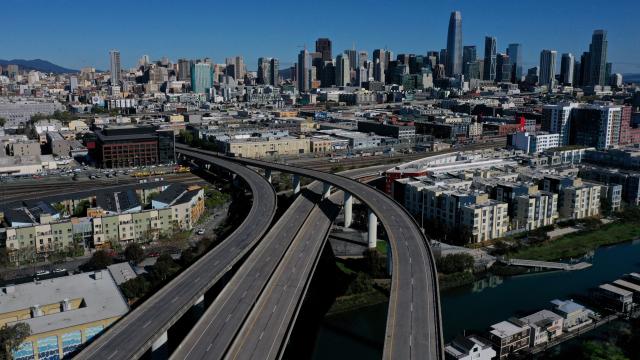As a result of the air pollution dropping dramatically, but several analyses are now showing that our greenhouse gas emissions are dropping, too. In fact, the pandemic may lead to the largest annual fall in emissions ever recorded.
Carbon Brief, a UK-based environmental news site, crunched the data and published an analysis Thursday that found the pandemic could cause carbon emissions could dip 1,600 megatons this year. That’s equivalent to taking more than 345 million cars off the road and would be the biggest annual drop in emissions ever recorded. It may also be an underestimate as we wait for more data to become available from other countries and sectors hit by what is a global pandemic.
The huge drop in emissions is not a reason to celebrate the pandemic, of course. At least 90,000 people have died and 1.5 million have gotten sick globally, according to data tracked by Johns Hopkins. In the U.S. alone, the unemployment rate has spiked to 13 per cent as more than 17 million people have filed for unemployment in the past three weeks alone. Shit is real, and the negative impacts of the pandemic on the economy and public health will be felt for years to come. In that light, the projected drop on greenhouse gas emissions is another sign of just how unprecedented the situation is and reflects how society has responded to the coronavirus.
Many people are working from home, so office buildings are using less energy from fossil fuels. The lockdowns also mean more cars off the road and less flights in the sky, further reducing emissions. Industrial activity has slowed, resulting in a 16-year low in energy demand, Reuters reported, marking yet another way carbon pollution is shrinking. The world looks a lot different than it did at the start of the year.
Yet the drop in emissions is still a far cry from what needs to happen to avert dangerous climate change. The Carbon Brief analysis shows that to prevent catastrophic warming, we need to reduce global emissions by 2,200 megatons of carbon dioxide a year for the next decade to have a good shot of capping warming at 1.5 degrees Celsius above pre-industrial levels.
That would require taking more than 475 million cars off the road every year. Or consuming 5 billion barrels less of oil. Doing whatever it takes to get there is the goal. Unfortunately, the current pandemic-driven drop in emissions the closest we’ve gotten to reducing emissions because our world leaders refuse to take the severity of the climate crisis seriously.
Dealing with a highly contagious virus is not a substitute for coming up with a meaningful climate plan. It’s not a sustainable, either. The U.S. Energy Information Administration released a forecast earlier this week that energy-related carbon dioxide emissions will drop by 7.5 per cent in 2020 compared to 2019. However, it also expects emissions to increase in 2021 by 3.6 per cent as the world economy recovers a bit.
We can’t wait for the next crisis to hit to lower our emissions, especially when we’ve already got a serious crisis on our hands. Leaders need to take action as soon as possible. The climate crisis is more than enough to handle, and battling two disasters at once will prove difficult and deadly.
